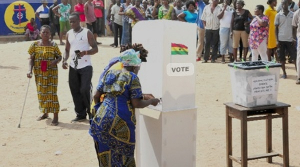- Home - News
- TWI News | TV
- Polls
- Year In Review
- News Archive
- Crime & Punishment
- Politics
- Regional
- Editorial
- Health
- Ghanaians Abroad
- Tabloid
- Africa
- Religion
- Election 2020
- Coronavirus
- News Videos | TV
- Photo Archives
- News Headlines
- Press Release
Business News of Tuesday, 8 July 2003
Source: Public Agenda
High Taxes Crippling Economy
High taxation in Ghana was a major topic that was hotly debated during the launching of the State of the Ghanaian Economy in Accra 2002 last week. In the opinion of Dr. Baffour Osei, a Senior Lecturer of Economics at the University of Ghana, 18 percent of Gross Domestic Product (GDP) was collected last year alone as tax revenue. In 1999 the percentage of GDP collected, as tax was 14 percent.
He said the 18 percent is an indication that Ghana has the highest taxation in West Africa. On the strength of this figure, Dr. Osei suggested that additional taxation should be off the shelves for now.
Dr. Osei explained that GDP in Ghana is driven by consumption, so if taxes continue with the current upward trend the government would stifle consumption and retard growth. ‘We should concentrate on efficiency in tax administration instead of introducing additional taxes'', Dr Osei added.
He said in some countries taxes are increased in line with growth targets the government plans to achieve, whereas other countries cut taxes as a policy to boost growth. ''In Ghana we increase taxes when we want to increase growth'', Dr. Osei explained.
Dr. Osei’s submission caught the attention of Mrs. Elizabeth Joyce Villars, President of both the Association of Ghana Industries and the Private Enterprise Foundation, as she was seen nodding in approval. The Association of Ghana Industries has complained several times about how high taxation is killing local industries. Last year the association pleaded with government to reduce the withholding tax from the current 7.5 percent to the original 5 percent, arguing that it is eroding their capital base and making them uncompetitive.
Dr. Osei’s view and the statistics contained in the report could only fuel the debate on taxation in Ghana. According to the report total receipts as a percentage of GDP increased from 30.73 percent in 2001 to 32.4 percent in 2002, indicating an expansion in the government’s share of GDP. The report said on the other hand, the ratio of tax revenue to GDP declined from 22.30 percent in 2001 to 18.24 percent in 2002.
Thus the net domestic financing increased from 2.27 percent of GDP in 2001 to 4.88 percent of GDP in 2002. On the face of it, for the government to finance most of its projects from domestic sources looks like good fiscal management, given the fact that many Ghanaians have complained about the over reliance on foreign donors for budgetary support. Viewed against Dr. Osei’s position of high taxation it leaves one wondering the next step government should take.
Tax revenue accounted for 82.72 percent of total government revenue in 2002 compared to 75.9 percent in 2001. Indirect taxes also contributed 20.89 percent of government revenue while direct taxes were 27.05 percent of the total.
The contribution of international trade to national revenue was just 19.30 percent. According to the report compared to the 2001 figures direct and indirect taxes increased their contribution to total revenue relative to taxes on international trade. This means the economy is not deriving much revenue from international trade.
The report states that trends in government revenue shows that direct taxes contributed 5.8 percent of the total, while 12.05 percent came from indirect taxes, including taxes on international trade. Direct taxes are levied on income and property of individuals and businesses. Given the fact that a large percentage of Ghanaians are below the poverty line and the fact that many businesses are small-scale industries deriving much revenue from indirect taxes could amount to scooping bread out of the mouth of the vulnerable.
For the 2002 period tax on income and property rose to ?2,975.4 billion in 2002 from ?2,123.7 billion, a 31.62 percent increase in collection. In its review of the 2002 the Center for Budget Advocacy (CBA) of ISODEC took a harsh stand on tax evasion and tax defaulters because of the belief that those who can pay the direct taxes should contribute to the common pot for channeling into provision of social amenities.
CBA therefore called for a progressive tax system to make heavy users of natural resources and public infrastructure pay more tax. In the view of CBA, the new tax measures introduced in 2001 and 2002 only benefited the high-income brackets more, making the current tax regime more regressive. CBA further states that flaws in the tax collection mechanism encourages low level of voluntary compliance on direct taxes, especially among businesses and professionals. ''We have indicated earlier that this bias leaves a lot of the burden on salaried workers and a few in the informal sector as the main taxpayers.''
CBA thinks that the Ghanaian tax system, with its heavy reliance on indirect taxes, can only pass for anti-workers. ''We hereby renew our call on the government to reinstate a tax system that is progressive and developmental both in design and practice.''










